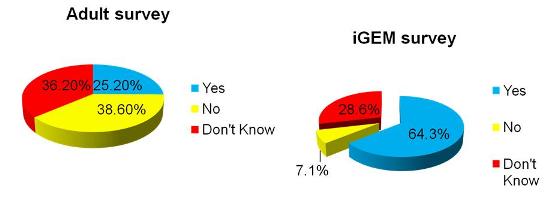Team:Calgary Ethics/Adult Surveys
From 2008.igem.org
 |
|
|
The Surveys: How much do people know about Synthetic Biology and what do they think about it?"As bioengineers continue to build things with the stuff of life itself, the rest of the world is slowly waking up to the power of synthetic biology." (Fong, 2008) With the rapid advancement of synthetic biology, there are many ethical issues associated that will become increasingly important. The general public is likely to be impacted by new developments in the field, yet most people are largely unaware of Synthetic Biology. One study found that more than 80% of Americans had heard little or nothing about the field (Braman, Kahan, Mandel, 2008.) Since Synthetic Biology has implications on a global scale, our team sought to get a comprehensive understanding of how members of different groups across many countries knew about synthetic biology and what their opinions were on the risks and benefits of the field. We developed two online surveys to target two main populations: The Adult Survey: Targeted members of NGO's, government, Industry, University (both faculty and students) and participants of the 2008 iGEM competition. The High School Survey: Targeted high school students participating in extra-curricular summer programs geared toward science and engineering. Both surveys were exploratory in nature. We relied mainly on open ended questions and provided only one general definition of synthetic biology at the beginning of the survey. This was done in an effort to minimize bias. The Adult Survey254 participants (click here for a breakdown of the demographics) The ResultsClick the link to see all responses (media:ADULT_SUMMARY.xls) A large portion of our sample (65.1%) knew what synthetic biology was. (Click here for the breakdown across different groups) This number was much higher than that found in Braman, Kahan and Mandel’s, study that found this to be true in only 18% of their sample (2008). This is largely due to the fact that their sample targeted the average person in the United States, and our survey was limited by being sent through academic, government, NGO and industry networks. Across NGOs, Industry, Government and Academia there was a predominantly high concern over social, ethical, political, cultural and economic issues. The iGEM sample, however, showed little to no concern for political, cultural and privacy issues and partial concern over issues regarding regulation. (Click here for the breakdown across the entire sample) Insights into ethical issues:Do we have the right to alter nature at any level? Many individuals who showed concern for utilizing the synthetic biology suggested that altering things for our own benefit or for what we think will have positive consequences is extremely dangerous. Should Synbio be used for enhancement purposes? Human ApplicationMany issues came up regarding using the synthetic biology approach on humans such as:
Biosecurity"I don't think anything good can come from messing with nature at this level, even if used for altruistic purposes; if it gets into the wrong hands (and it will) it unleashes too many unknowns and ethical issues." Regulation91.5% (130) were in favour of regulation and the open question was dominated by support for a multiple tier regulatory body, the most common being an international, federal, and participatory approach.
In order for a collaboration of this type to be effective, an approach to regulation that allows for the efficient translation of information from those working in synthetic biology to and among the regulatory bodies is a necessity. Implications:There were clear differences in degree of concern between IGEM participants and all other groups surveyed. This indicates a gap between the scientific community and all other groups in how they perceived Synthetic Biology. While iGEM was less concerned about ethical, social and cultural issues, all non-Igem participants showed a high level of concern for these issues. Such concern was based upon limited knowledge of the field. It is important to take away from this survey that individuals in NGOs, government, industry and Academia are eager to participate in the discourse on Synthetic Biology. Their perspectives must be understood by members of the scientific community in order to appease the concerns of members of these groups and obtain support for the field of Synthetic Biology. |
| Home | Team | Adult Survey | High School Survey | Collaboration | Future Plans | Acknowledgement | Notebook |
|---|
 "
"

